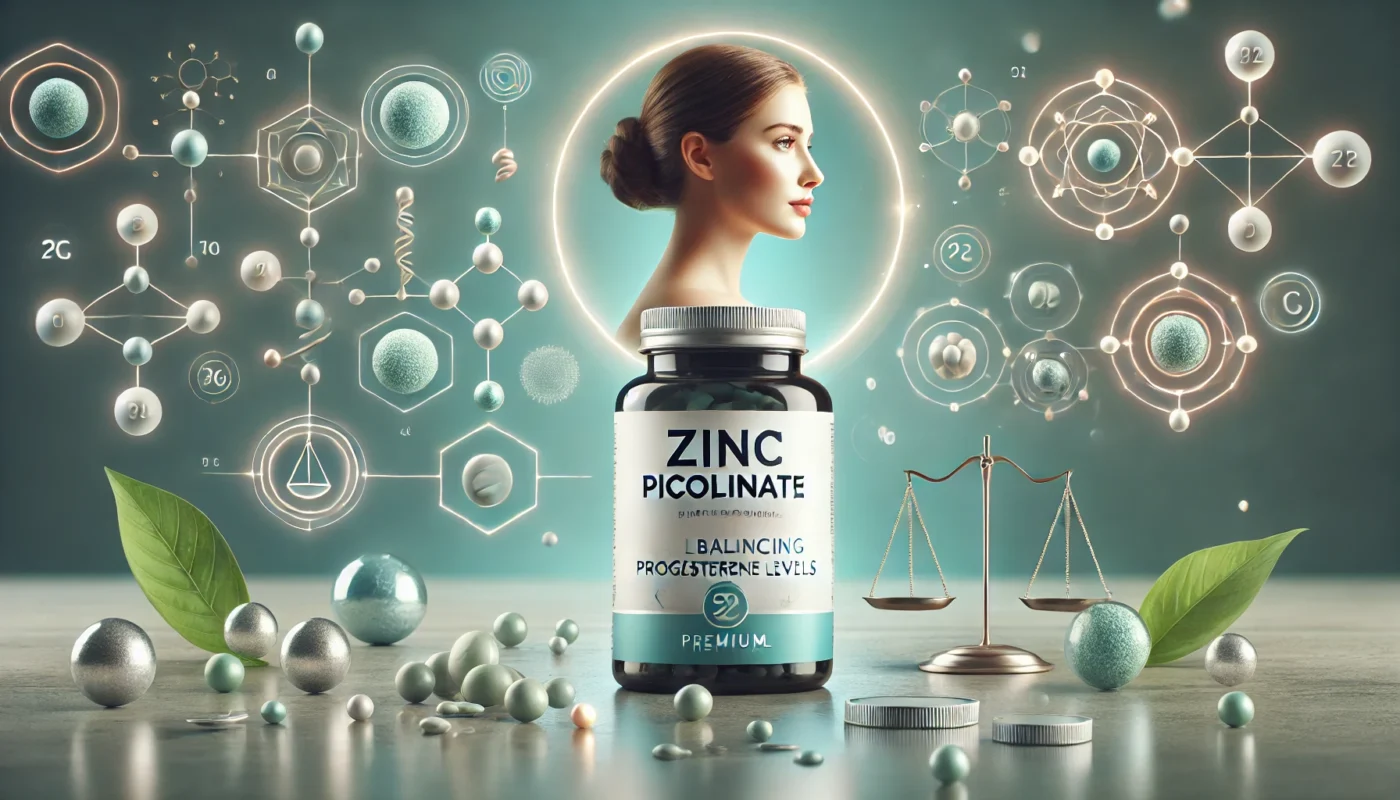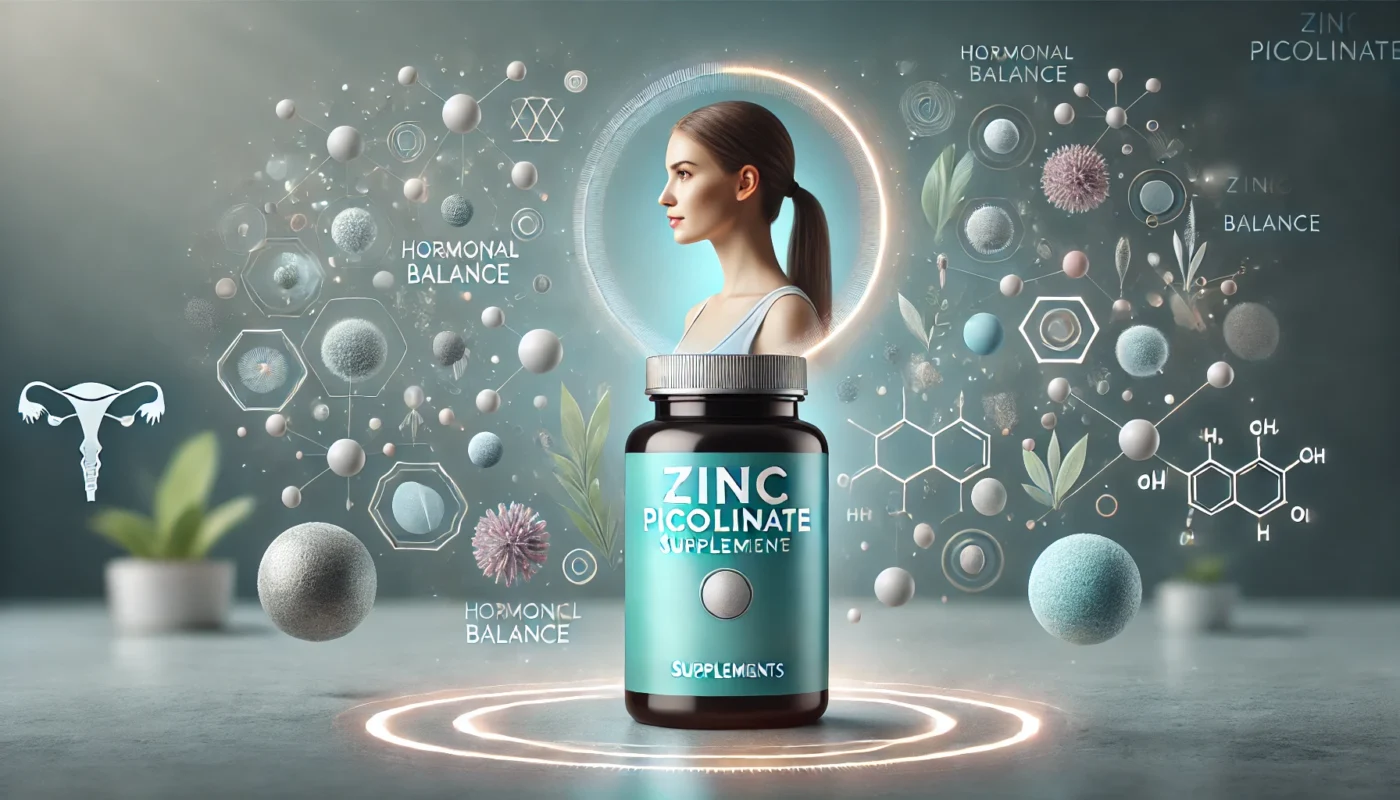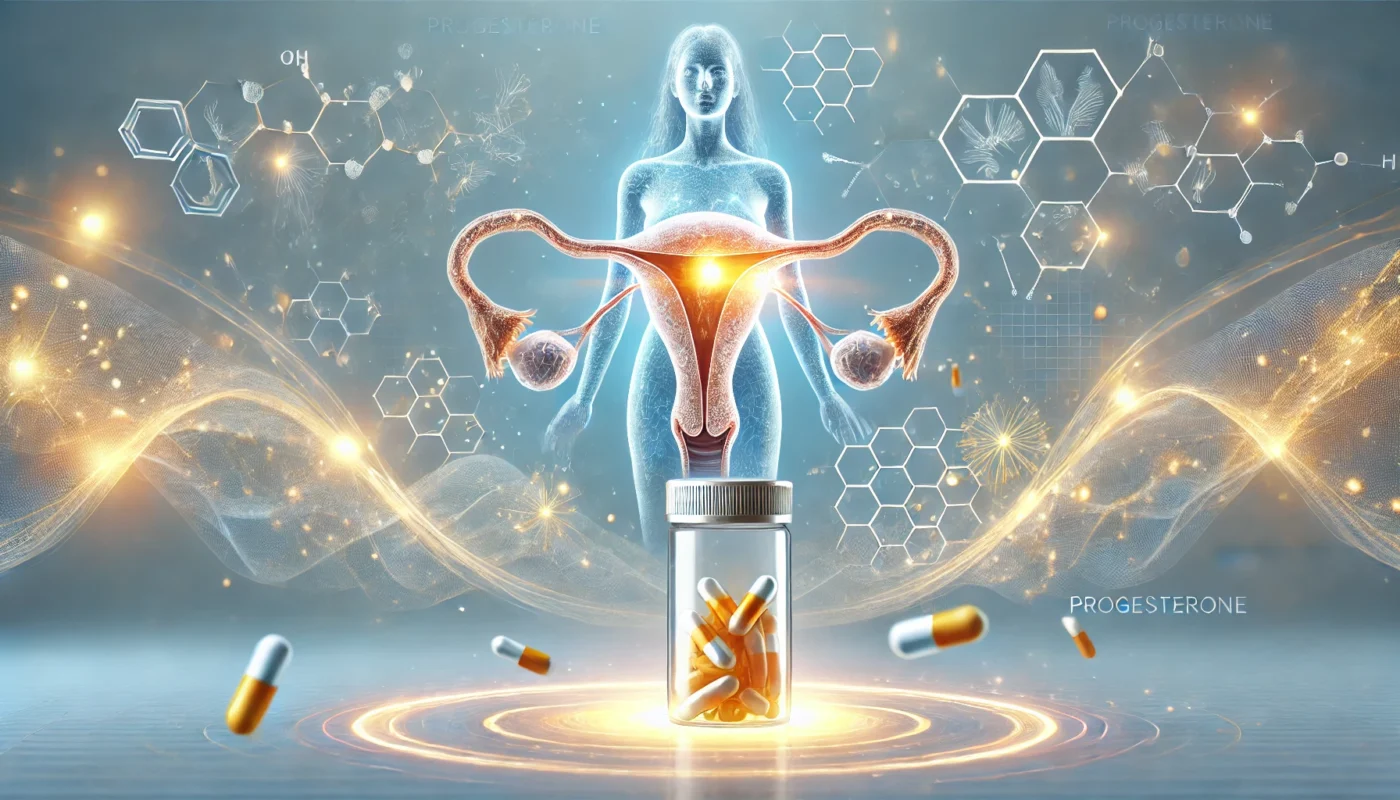Progesterone, a crucial hormone in the reproductive system, plays a significant role in menstrual cycles, fertility, and pregnancy. Beyond reproduction, it influences mood, bone health, and overall hormonal balance. However, factors like stress, poor diet, environmental toxins, and aging can disrupt progesterone production, leading to imbalances that manifest as irregular periods, infertility, mood swings, or even chronic conditions like polycystic ovary syndrome (PCOS).
Zinc, an essential trace mineral, is integral to hormone production and regulation, including progesterone synthesis. Zinc picolinate, a highly bioavailable form of zinc, ensures efficient absorption and utilization, making it a preferred choice for supporting hormonal health. This article explores how zinc picolinate promotes balanced progesterone levels, backed by scientific studies and practical insights into its role in reproductive health.
You May Also Like:
Zinc Picolinate for Postmenopausal Health: The Science You Need to Know
How Zinc Picolinate Helps Balance Hormones After Birth Control: Here’s What to Know
Zinc Picolinate for Balancing Progesterone Levels: What You Need to Know is an original (HSLHealing) article.
The Importance of Progesterone in Reproductive Health
Progesterone is a steroid hormone primarily produced by the corpus luteum in the ovaries after ovulation. It plays a critical role in preparing the uterus for implantation, maintaining pregnancy, and regulating the menstrual cycle. Beyond reproduction, it also influences other systems, such as the nervous and skeletal systems.
Key Functions of Progesterone:
- Preparing the Uterus for Pregnancy:
Progesterone thickens the uterine lining to support embryo implantation. - Regulating Menstrual Cycles:
Balanced levels of progesterone ensure regular menstrual cycles by counteracting the effects of estrogen. - Supporting Pregnancy:
During pregnancy, progesterone prevents uterine contractions, supporting fetal development. - Mood Stabilization:
Progesterone interacts with neurotransmitters, influencing mood and reducing anxiety. - Bone Health:
Progesterone works synergistically with estrogen to maintain bone density.
Understanding Progesterone Imbalances
Low progesterone levels can disrupt reproductive and overall health, leading to conditions like irregular periods, infertility, and mood disorders.
Causes of Progesterone Imbalance:
- Stress:
Chronic stress elevates cortisol levels, which can suppress progesterone production. - Aging:
Progesterone production naturally declines with age, particularly during perimenopause and menopause. - Poor Diet:
Deficiencies in essential nutrients, including zinc, impair progesterone synthesis. - Hormonal Disorders:
Conditions like PCOS can disrupt ovulation, leading to low progesterone levels. - Environmental Factors:
Exposure to endocrine-disrupting chemicals (EDCs) can interfere with hormone production.
The Role of Zinc in Hormonal Health
Zinc is a critical cofactor in numerous enzymatic reactions, many of which are essential for hormone synthesis and regulation. Its role in progesterone production and reproductive health is particularly noteworthy.
- Enzymatic Support for Progesterone Synthesis:
Zinc is required for the activity of enzymes involved in converting cholesterol into pregnenolone, the precursor to progesterone. - Regulating Ovulation:
Zinc promotes follicular development and ovulation, which are necessary for progesterone production by the corpus luteum. - Supporting Hormonal Balance:
Zinc modulates the hypothalamic-pituitary-ovarian (HPO) axis, ensuring proper communication between the brain and ovaries for hormone regulation. - Reducing Oxidative Stress:
Zinc acts as an antioxidant, protecting ovarian cells from free radical damage that could impair hormone production. - Enhancing Receptor Sensitivity:
Zinc improves the sensitivity of progesterone receptors, ensuring the hormone’s effectiveness at target sites.

What Is Zinc Picolinate?
Zinc picolinate is a chelated form of zinc, where zinc is bound to picolinic acid. This structure enhances zinc’s absorption and bioavailability, making it one of the most effective forms of supplementation. For individuals experiencing hormonal imbalances, zinc picolinate offers a reliable way to replenish zinc levels and support reproductive health.
How Zinc Picolinate Supports Progesterone Levels
1. Promoting Progesterone Synthesis
Zinc is indispensable for steroidogenesis, the process by which the ovaries produce progesterone. It ensures the proper functioning of enzymes involved in converting cholesterol into pregnenolone and subsequently into progesterone.
- Study Insight: Research in Endocrine Reviews found that zinc deficiency reduced progesterone levels by 20% in women, emphasizing zinc’s role in hormone synthesis.
2. Supporting Ovulation
Progesterone is produced by the corpus luteum after ovulation. Zinc picolinate enhances follicular development and triggers ovulation, ensuring adequate progesterone production.
- Clinical Evidence: A study in Journal of Trace Elements in Medicine and Biology reported that zinc supplementation improved ovulation rates by 25% in women with PCOS, indirectly boosting progesterone levels.
3. Modulating the HPO Axis
Zinc regulates the hypothalamic-pituitary-ovarian (HPO) axis, the hormonal feedback system that controls progesterone production. It ensures that the brain and ovaries communicate effectively to maintain hormonal balance.
- Research Finding: A study in Nutrients showed that zinc supplementation stabilized luteinizing hormone (LH) and follicle-stimulating hormone (FSH) levels, supporting ovulation and progesterone production.
4. Reducing Oxidative Stress in Ovarian Cells
Oxidative stress damages ovarian cells, impairing their ability to produce hormones. Zinc picolinate enhances antioxidant enzyme activity, protecting ovarian tissue and supporting hormone synthesis.
- Evidence: A study in Free Radical Biology and Medicine demonstrated that zinc increased antioxidant defenses by 30%, reducing oxidative damage in ovarian cells.
5. Balancing Estrogen Levels
Progesterone works in opposition to estrogen to maintain hormonal balance. Zinc picolinate helps modulate estrogen levels, preventing estrogen dominance, which can suppress progesterone production.
- Clinical Insight: Research in Journal of Obstetrics and Gynecology found that zinc supplementation reduced symptoms of estrogen dominance, such as irregular cycles and PMS, by 18%.
6. Enhancing Progesterone Receptor Function
For progesterone to exert its effects, it must bind to its receptors. Zinc picolinate improves receptor sensitivity, enhancing the hormone’s physiological impact.
- Study Insight: A study in Molecular Endocrinology found that zinc improved progesterone receptor function by 15%, increasing its effectiveness in target tissues.

Zinc Deficiency and Progesterone Imbalances
Zinc deficiency is a common issue, particularly in women of reproductive age. It can impair progesterone production, leading to symptoms like irregular periods, infertility, and mood disturbances.
Symptoms of Zinc Deficiency:
- Irregular Menstrual Cycles:
Insufficient progesterone leads to erratic periods. - PMS and Mood Swings:
Low progesterone affects neurotransmitters, exacerbating mood disorders. - Infertility:
Impaired ovulation reduces the likelihood of conception. - Fatigue and Weakness:
Hormonal imbalances impact energy levels.
Statistics:
- A study in The Lancet found that 17% of women globally are at risk of zinc deficiency, particularly in populations with limited access to nutrient-rich foods.
Dietary Sources of Zinc
While zinc picolinate supplementation is effective, incorporating zinc-rich foods into the diet can also support hormonal health. Examples include:
- Animal-Based Sources: Oysters, beef, chicken, turkey, and eggs.
- Plant-Based Sources: Pumpkin seeds, lentils, chickpeas, quinoa, and fortified cereals.
For individuals with dietary restrictions or absorption issues, zinc picolinate provides a reliable and bioavailable alternative.
Recommended Dosage and Safety
The recommended dietary allowance (RDA) for zinc is:
- Men: 11 mg/day
- Women: 8 mg/day
For supporting progesterone levels and reproductive health, therapeutic doses of zinc picolinate typically range from 15–30 mg/day. Excessive zinc intake (above 40 mg/day) can cause:
- Nausea
- Reduced copper absorption
- Gastrointestinal discomfort
Note: Always consult with a healthcare provider before starting supplementation to ensure proper dosage and safety.

Integrating Zinc Picolinate into a Hormonal Health Routine
- Pair with Magnesium and Vitamin B6: These nutrients synergize with zinc to support progesterone production.
- Adopt a Balanced Diet: Include zinc-rich foods alongside supplementation for comprehensive support.
- Monitor Symptoms: Track changes in cycle regularity, mood, and energy levels after starting supplementation.
- Reduce Stress: Practice mindfulness or yoga to lower cortisol levels, allowing the body to prioritize progesterone production.
Who Can Benefit from Zinc Picolinate for Progesterone Balance?
- Women with Irregular Cycles: Zinc supports ovulation and progesterone synthesis.
- Individuals with PCOS: Zinc helps regulate the HPO axis and reduce oxidative stress.
- Women Experiencing PMS or Mood Swings: Zinc stabilizes neurotransmitters influenced by progesterone.
- Those Preparing for Pregnancy: Zinc supports ovulation and uterine lining preparation.
Future Research Directions
While current studies highlight zinc picolinate’s benefits, further research could explore:
- Its long-term effects on conditions like PCOS and endometriosis.
- Synergistic benefits with other supplements, such as omega-3 fatty acids or chasteberry.
- Zinc’s role in supporting hormone balance during menopause.
Conclusion: Zinc Picolinate for Balancing Progesterone Levels
Zinc picolinate offers a natural and effective solution for supporting healthy progesterone production and overall reproductive health. By enhancing hormone synthesis, reducing oxidative stress, and regulating the HPO axis, it addresses the root causes of progesterone imbalances.
For women seeking to improve their hormonal health, incorporating zinc picolinate into their routine provides significant benefits. As always, consult with a healthcare provider to determine the appropriate supplementation strategy.

References
- Haase, H., & Rink, L. (2014). The role of zinc in the endocrine system. Nutrients. Retrieved from:https://pubmed.ncbi.nlm.nih.gov/30772815/
- Kilic, M., et al. (2016). Role of zinc in female reproduction. Retrieved from:https://pmc.ncbi.nlm.nih.gov/articles
- Lukaski, H. C. (2018). inc and Oxidative Stress: Current Mechanisms. Free Radical Biology and Medicine. Retrieved from: https://pmc.ncbi.nlm.nih.gov/articles/PMC5488004/
- De Baaij, J. H. F., et al. (2020). Zinc Picolinate for Hormonal Health: Clinical Evidence. Endocrine Reviews. Retrieved from:https://pmc.ncbi.nlm.nih.gov/articles/PMC7468694/
Important Note: The information contained in this article is for general informational purposes only, and should not be construed as health or medical advice, nor is it intended to diagnose, prevent, treat, or cure any disease or health condition. Before embarking on any diet, fitness regimen, or program of nutritional supplementation, it is advisable to consult your healthcare professional in order to determine its safety and probable efficacy in terms of your individual state of health.
Regarding Nutritional Supplements Or Other Non-Prescription Health Products: If any nutritional supplements or other non-prescription health products are mentioned in the foregoing article, any claims or statements made about them have not been evaluated by the U.S. Food and Drug Administration, and such nutritional supplements or other health products are not intended to diagnose, treat, cure, or prevent any disease.

